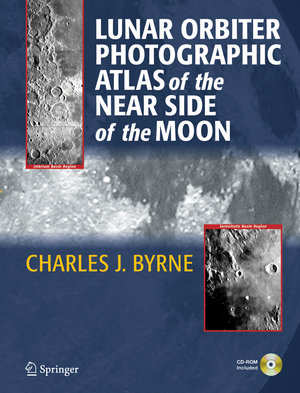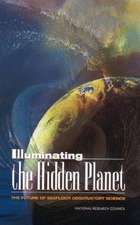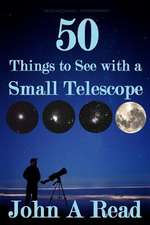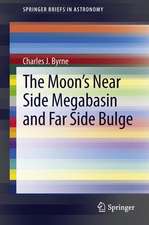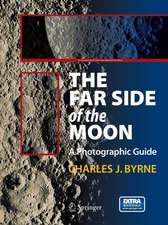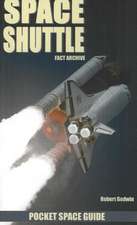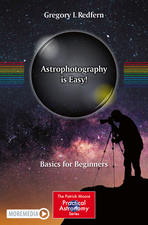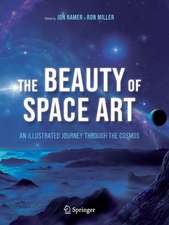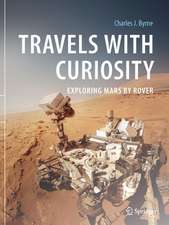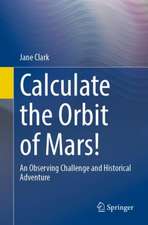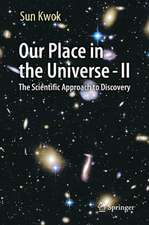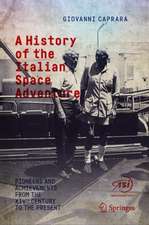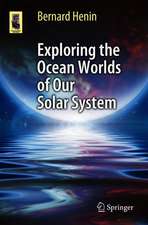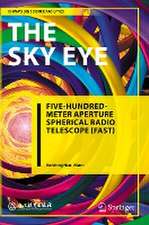Lunar Orbiter Photographic Atlas of the Near Side of the Moon
Autor Charles Byrneen Limba Engleză Hardback – 27 mai 2005
Using 21st century techniques, Charles Byrne – previously System Engineer of the Apollo Program for Lunar Orbiter Photography – has removed the artifacts and imperfections to produce the most comprehensive and beautifully detailed set of images of the lunar surface.
The book has been organized to make it easy for astronomers to use, enabling ground-based images and views to be compared with the Orbiter photograph. All features have been identified with their current IAU-approved names, and each photograph has been located in terms of latitude and longitude. To help practical astronomers, all the photographs are systematically related to an Earth-based view.
Preț: 594.46 lei
Preț vechi: 646.15 lei
-8% Nou
Puncte Express: 892
Preț estimativ în valută:
113.75€ • 118.76$ • 94.14£
113.75€ • 118.76$ • 94.14£
Carte disponibilă
Livrare economică 15-29 martie
Preluare comenzi: 021 569.72.76
Specificații
ISBN-13: 9781852338862
ISBN-10: 1852338865
Pagini: 340
Ilustrații: X, 329 p. 23 illus., 1 illus. in color. With online files/update.
Dimensiuni: 210 x 279 x 27 mm
Greutate: 1.74 kg
Ediția:2005
Editura: SPRINGER LONDON
Colecția Springer
Locul publicării:London, United Kingdom
ISBN-10: 1852338865
Pagini: 340
Ilustrații: X, 329 p. 23 illus., 1 illus. in color. With online files/update.
Dimensiuni: 210 x 279 x 27 mm
Greutate: 1.74 kg
Ediția:2005
Editura: SPRINGER LONDON
Colecția Springer
Locul publicării:London, United Kingdom
Public țintă
Popular/generalCuprins
Overview of the Atlas.- Lunar Orbiter Mission 4.- Overview of the Near Side of the Moon.- Organization of the Photos.- Orientale Basin Region.- Humorum Basin Region.- Imbrium Basin Region.- Nectaris Basin Region.- Serenitatis Basin Region.- Eastern Basins Region.- North Polar Region.- South Polar Region.
Recenzii
From the reviews:
Choice Outstanding Title! (January 2006)
"With plans to return astronauts to the Moon, our nearest planetary body is of obvious interest at the moment. … The book has been organised to make it easy for astronomers to use … . the quality of reproduction in this volume is excellent and readers will undoubtedly spend endless hours vicariously exploring the lunar surface. " (International Space Review, 2006)
Choice Outstanding Title! (January 2006)
"With plans to return astronauts to the Moon, our nearest planetary body is of obvious interest at the moment. … The book has been organised to make it easy for astronomers to use … . the quality of reproduction in this volume is excellent and readers will undoubtedly spend endless hours vicariously exploring the lunar surface. " (International Space Review, 2006)
Textul de pe ultima copertă
In 1967, Lunar Orbiter Mission 4 sent back to Earth a superb series of photographs of the surface of the Moon, despite severe degradation caused by scanning and the reconstruction processes involved in transmission from lunar orbit.
Using 21st century techniques, Charles Byrne - previously System Engineer of the Apollo Program for Lunar Orbiter Photography - has removed almost all the artifacts and imperfections to provide a comprehensive and beautifully detailed set of images of the lunar surface.
The book has been organized to make it easy for astronomers to use, enabling ground-based images and views to be compared with the Orbiter photographs. The photographs are striking for their consistent Sun angles (for uniform appearance). All features are identified with their current IAU-approved names, and each photograph is located in terms of latitude and longitude. To help practical astronomers, all the photographs are systematically related to an Earth-based view.
Using 21st century techniques, Charles Byrne - previously System Engineer of the Apollo Program for Lunar Orbiter Photography - has removed almost all the artifacts and imperfections to provide a comprehensive and beautifully detailed set of images of the lunar surface.
The book has been organized to make it easy for astronomers to use, enabling ground-based images and views to be compared with the Orbiter photographs. The photographs are striking for their consistent Sun angles (for uniform appearance). All features are identified with their current IAU-approved names, and each photograph is located in terms of latitude and longitude. To help practical astronomers, all the photographs are systematically related to an Earth-based view.
Caracteristici
Spectacular close-up images of the Moon Reference map so astronomers can compare the images with what they can see Indentification of features with their IAU names Severe degrading effects of the original images have been removed, making features clearer Notes based on extensive review of the scientific literature and recent meetings
